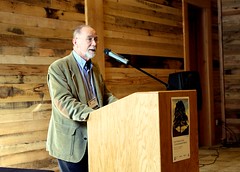
/
RSS Feed
Drew Hyland, Charles A. Dana Professor of Philosophy at Trinity College, commented on my book, Aristotle on the Nature of Truth, at the 2011 meeting of the Ancient Philosophy Society.
Drew’s comments focused largely on the question of my interpretation of Aristotle’s approach to the thinking of his predecessors. I argue in the book that the practice of “legomenology” involves attending to the things said by one’s predecessors as the place where philosophy must begin. Further, I suggest that Aristotle’s engagement with his predecessors was not designed simply to legitimize Aristotle’s own position, but was a genuine attempt to think with and against those who in the past had sought to speak the truth of nature.
Drew recognizes this as precisely the way philosophy ought to be practiced, but he questions what he calls my generous reading of Aristotle, suggesting that Aristotle in fact is interested in his predecessors only insofar as they lead up to his own thinking. Drew also calls into question the degree to which I read a Heraclitean understanding of logos into Aristotle. He argues further that I bring Aristotle too close to Plato who made aporia a stance toward the world as opposed to focusing on aporiai which point to a series of problems to solve. Finally, at the end, Drew calls attention to my interpretation of God in Aristotle.
In his commentary, Drew touched upon two of the most difficult sentences to write in the book. Give a listen to his commentary, and to my response (to be posted in the days to come).
Drew Hyland responds to Aristotle on the Nature of Truth
To hear the other comments and my responses, click on the links below:
Here are images from the APS Book Panel:


looking forward to your answer these questions/insights, I would go further yet and say that the world/cosmos has body [matter(s) to us] but not psyche and so has no intentions towards us, no mind to pay us (and therefore doesn’t hide/withdraw either).